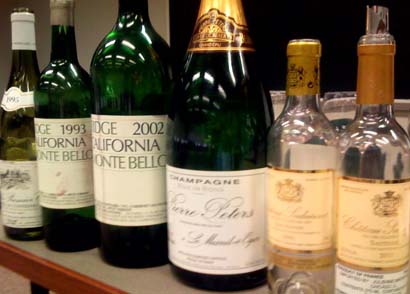Magnums, what are they good for, Terry Theise?
Is bigger better?
This perennial question came up during my class on Saturday at the University of Chicago. In this context, it related to bottle size, specifically, magnums.
The tasting had two magnums, one of Pierre Peters, “cuvee de reserve” Champagne and another of Ridge Monte Bello 2002. How sweet it is to organize tastings!
Anticipating the question of size, um, arising, I asked none other than the importer of the champagne, Terry Theise, via email beforehand. Here is his reply (reproduced with permission):
Hey Tyler – there is indeed a very good reason for buying Champagnes in Magnum; it is said to be the “perfect size†to promote a tempo and type of aging by which Champagne is said to show its best. Candidly, I myself don’t know why nor if there even is a “why,†and if there is I’m sure the explanation would be abstruse. I can tell you empirically that whenever I’ve had the chance to compare the same bottle-aged wine (e.g., Vilmart’s 1992 Coeur du Cuvée) in bottle and Mag, the bottle showed more oxidative nutty development whereas the Magnum showed more estery, fresh and firm, and most important, more complex.
Some of this can get lost in theater, such as when restaurants pour young (usually commercial) Champagne by the glass from Magnums, which in fact is deleterious because the wines are painfully fruitless and reticent. Mags are for laying down. If you’re going to drink the wine within five years of disgorgement, do so from bottle.
Why not pour that Peters from both sizes at your seminar, and discuss the distinctions?
Sadly we couldn’t take him up on his suggestion to double up since I had already blown the budget. Do magnums attenuate the effect of oxygen and become the perfect bottles for aging slowly? Or is it sheer ostentatiousness at it best? Share your thoughts in the comments below.
(image: my cameraphone)





On October 1st, 2007 at 6:04 pm ,Jack wrote:
I, too, haven’t compared magnum vs. 750ml, but for sparklings, I read quite a few times how magnums often show better than the 750ml and that a few swear by that.
On October 1st, 2007 at 6:13 pm ,Debbie wrote:
What about still wines? Anyone have any experience with magnums vs 750s in non-sparklers?
On October 1st, 2007 at 9:03 pm ,Jack wrote:
Debbie – For still, magnums are best for long/longest aging. That’s why you see older Bordeaux in magnums, for example, going for significantly more than double the 750 cost. I’ve not read (or heard) any other benefit (unlike sparkling wine).
On October 1st, 2007 at 9:17 pm ,Dr.Debs wrote:
Tyler, I’ve actually experienced drinking the same champagne in the 750 and mag formats this summer at Roederer–due to be posted this Friday. But, the bottom line is that the two wines tasted very different to my palate. So much so that if I had tasted them blind, I would have sworn that they were different wines made in different years and aged for different lengths of time. So yes, I think if you are having a party and like lots of subtle nuances in your champagne buy a magnum because the bigger format does make the wine age differently.
On October 2nd, 2007 at 2:49 am ,ryan wrote:
My one Mag a LaSalle ’89 that I bought long ago was opened in 2003 and was incredibly corked! I would have cried if it had not been for the fact that I had a bottle of ’59 d’yquem to taste at the end of the meal. That more than made up for it!
On November 1st, 2007 at 8:58 am ,Andrew wrote:
Here is a very cost effective way of trying the debate, I regularly lay down magnums of La Vieille Ferma from the Cotes du Ventoux produced by one of the Perin brothers from the Rhone. Following some years, in the range of 4-6 I serve them at dinner parties to very good reviews. I have layed down the single bottles and noticed a shorter time period for the same results.
On May 16th, 2008 at 11:50 am ,Two wine classes in Chicago this fall - with books! | Dr Vino's wine blog wrote:
[…] from the two countries. The wine budget for these events is good and in the past we have had some excellent mature wines in a variety of sizes. All participants will receive a signed copy of the book as part of the enrollment. Details and […]
On September 23rd, 2009 at 3:22 am ,enoteca wrote:
Bigger is better because of a larger volume to cork cross sectional density ratio, hence, slower oxidation rate. Also, the larger volume subjects the wine to less temperature dynamics.
The question of what are they good for can be answered by more bottles sold. Don’t know of anyone who buys in large format without buying bottles. One must assess the development of the larger bottles by uncorking a bottle size now and then. This answer is a bit tongue in cheek. Another reason magnums are good is for the benefit of your offspring. In their wine education, when they come of age, you can tell them this here magnum tastes about the same as the bottle size did about the time they were born.